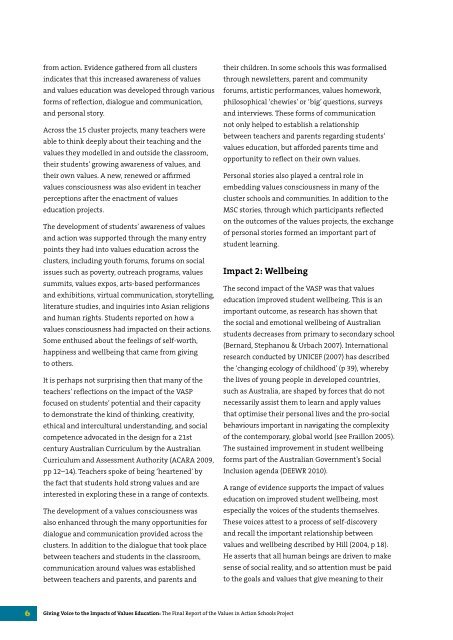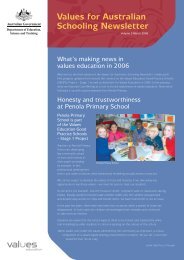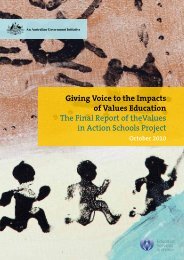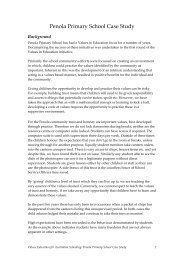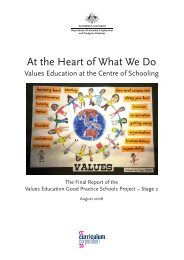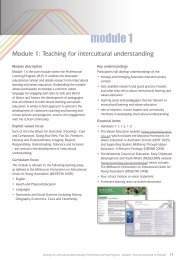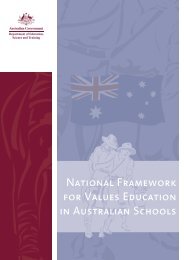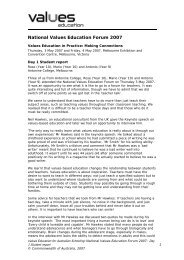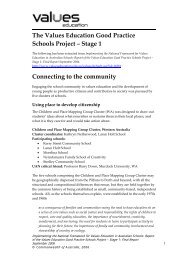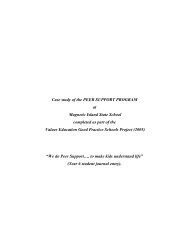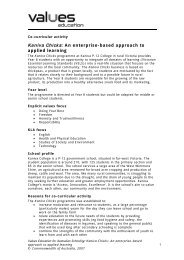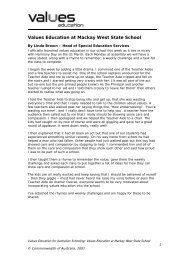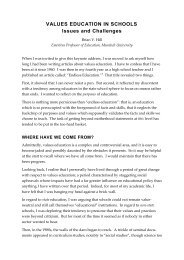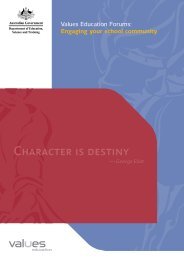Giving Voice to the Impacts of Values Education The Final Report of ...
Giving Voice to the Impacts of Values Education The Final Report of ...
Giving Voice to the Impacts of Values Education The Final Report of ...
Create successful ePaper yourself
Turn your PDF publications into a flip-book with our unique Google optimized e-Paper software.
from action. Evidence ga<strong>the</strong>red from all clusters<br />
indicates that this increased awareness <strong>of</strong> values<br />
and values education was developed through various<br />
forms <strong>of</strong> reflection, dialogue and communication,<br />
and personal s<strong>to</strong>ry.<br />
Across <strong>the</strong> 15 cluster projects, many teachers were<br />
able <strong>to</strong> think deeply about <strong>the</strong>ir teaching and <strong>the</strong><br />
values <strong>the</strong>y modelled in and outside <strong>the</strong> classroom,<br />
<strong>the</strong>ir students’ growing awareness <strong>of</strong> values, and<br />
<strong>the</strong>ir own values. A new, renewed or affirmed<br />
values consciousness was also evident in teacher<br />
perceptions after <strong>the</strong> enactment <strong>of</strong> values<br />
education projects.<br />
<strong>The</strong> development <strong>of</strong> students’ awareness <strong>of</strong> values<br />
and action was supported through <strong>the</strong> many entry<br />
points <strong>the</strong>y had in<strong>to</strong> values education across <strong>the</strong><br />
clusters, including youth forums, forums on social<br />
issues such as poverty, outreach programs, values<br />
summits, values expos, arts-based performances<br />
and exhibitions, virtual communication, s<strong>to</strong>rytelling,<br />
literature studies, and inquiries in<strong>to</strong> Asian religions<br />
and human rights. Students reported on how a<br />
values consciousness had impacted on <strong>the</strong>ir actions.<br />
Some enthused about <strong>the</strong> feelings <strong>of</strong> self-worth,<br />
happiness and wellbeing that came from giving<br />
<strong>to</strong> o<strong>the</strong>rs.<br />
It is perhaps not surprising <strong>the</strong>n that many <strong>of</strong> <strong>the</strong><br />
teachers’ reflections on <strong>the</strong> impact <strong>of</strong> <strong>the</strong> VASP<br />
focused on students’ potential and <strong>the</strong>ir capacity<br />
<strong>to</strong> demonstrate <strong>the</strong> kind <strong>of</strong> thinking, creativity,<br />
ethical and intercultural understanding, and social<br />
competence advocated in <strong>the</strong> design for a 21st<br />
century Australian Curriculum by <strong>the</strong> Australian<br />
Curriculum and Assessment Authority (ACARA 2009,<br />
pp 12–14). Teachers spoke <strong>of</strong> being ‘heartened’ by<br />
<strong>the</strong> fact that students hold strong values and are<br />
interested in exploring <strong>the</strong>se in a range <strong>of</strong> contexts.<br />
<strong>The</strong> development <strong>of</strong> a values consciousness was<br />
also enhanced through <strong>the</strong> many opportunities for<br />
dialogue and communication provided across <strong>the</strong><br />
clusters. In addition <strong>to</strong> <strong>the</strong> dialogue that <strong>to</strong>ok place<br />
between teachers and students in <strong>the</strong> classroom,<br />
communication around values was established<br />
between teachers and parents, and parents and<br />
<strong>the</strong>ir children. In some schools this was formalised<br />
through newsletters, parent and community<br />
forums, artistic performances, values homework,<br />
philosophical ‘chewies’ or ‘big’ questions, surveys<br />
and interviews. <strong>The</strong>se forms <strong>of</strong> communication<br />
not only helped <strong>to</strong> establish a relationship<br />
between teachers and parents regarding students’<br />
values education, but afforded parents time and<br />
opportunity <strong>to</strong> reflect on <strong>the</strong>ir own values.<br />
Personal s<strong>to</strong>ries also played a central role in<br />
embedding values consciousness in many <strong>of</strong> <strong>the</strong><br />
cluster schools and communities. In addition <strong>to</strong> <strong>the</strong><br />
MSC s<strong>to</strong>ries, through which participants reflected<br />
on <strong>the</strong> outcomes <strong>of</strong> <strong>the</strong> values projects, <strong>the</strong> exchange<br />
<strong>of</strong> personal s<strong>to</strong>ries formed an important part <strong>of</strong><br />
student learning.<br />
Impact 2: Wellbeing<br />
<strong>The</strong> second impact <strong>of</strong> <strong>the</strong> VASP was that values<br />
education improved student wellbeing. This is an<br />
important outcome, as research has shown that<br />
<strong>the</strong> social and emotional wellbeing <strong>of</strong> Australian<br />
students decreases from primary <strong>to</strong> secondary school<br />
(Bernard, Stephanou & Urbach 2007). International<br />
research conducted by UNICEF (2007) has described<br />
<strong>the</strong> ‘changing ecology <strong>of</strong> childhood’ (p 39), whereby<br />
<strong>the</strong> lives <strong>of</strong> young people in developed countries,<br />
such as Australia, are shaped by forces that do not<br />
necessarily assist <strong>the</strong>m <strong>to</strong> learn and apply values<br />
that optimise <strong>the</strong>ir personal lives and <strong>the</strong> pro-social<br />
behaviours important in navigating <strong>the</strong> complexity<br />
<strong>of</strong> <strong>the</strong> contemporary, global world (see Fraillon 2005).<br />
<strong>The</strong> sustained improvement in student wellbeing<br />
forms part <strong>of</strong> <strong>the</strong> Australian Government’s Social<br />
Inclusion agenda (DEEWR 2010).<br />
A range <strong>of</strong> evidence supports <strong>the</strong> impact <strong>of</strong> values<br />
education on improved student wellbeing, most<br />
especially <strong>the</strong> voices <strong>of</strong> <strong>the</strong> students <strong>the</strong>mselves.<br />
<strong>The</strong>se voices attest <strong>to</strong> a process <strong>of</strong> self-discovery<br />
and recall <strong>the</strong> important relationship between<br />
values and wellbeing described by Hill (2004, p 18).<br />
He asserts that all human beings are driven <strong>to</strong> make<br />
sense <strong>of</strong> social reality, and so attention must be paid<br />
<strong>to</strong> <strong>the</strong> goals and values that give meaning <strong>to</strong> <strong>the</strong>ir<br />
6 <strong>Giving</strong> <strong>Voice</strong> <strong>to</strong> <strong>the</strong> <strong>Impacts</strong> <strong>of</strong> <strong>Values</strong> <strong>Education</strong>: <strong>The</strong> <strong>Final</strong> <strong>Report</strong> <strong>of</strong> <strong>the</strong> <strong>Values</strong> in Action Schools Project


